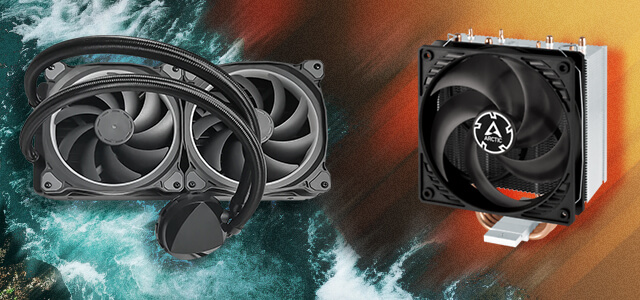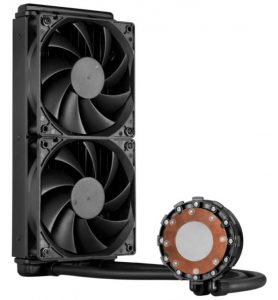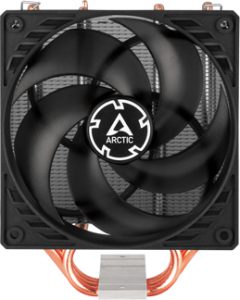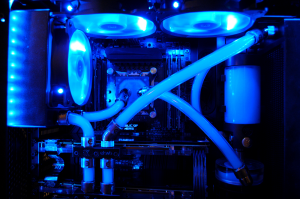
With their new Zen architecture release, AMD reignited the processor wars. Now they’re fighting tooth and nail with Intel for every scrap of market share available. As the battle has worn on though, these two have continued to find ways to increase core count and frequency in order to better position themselves with consumers and best the competition. But how is this done? Well, effectively there are two ways to boost CPU performance 1) build more efficient architecture and 2) increase TDP (i.e. higher wattages). And since method #2 involves much less R&D, it’s been the well the industry (and mainly Intel) has gone to the past few years. But what’s the byproduct of increasing TDP on the same architecture?
That’s right, class, it’s heat. And since processors are getting hotter, that makes the cooling solution you choose for your next build all the more important. So, when choosing liquid vs air cooling – which is best? Read on to find out.
What is Liquid Cooling?
 CPU liquid coolers circulate a liquid – in most cases a glycol solution of some type – through the CPU heatsink to dissipate heat. There are several ways to do this including complex custom loops with hard or soft tubing and open reservoirs, but the majority of liquid coolers are closed loop AIOs. These coolers consist of a heatsink, flat radiator, and two tubes connecting them to circulate the liquid. These units are fully sealed, require no maintenance, and are generally very effective coolers.
CPU liquid coolers circulate a liquid – in most cases a glycol solution of some type – through the CPU heatsink to dissipate heat. There are several ways to do this including complex custom loops with hard or soft tubing and open reservoirs, but the majority of liquid coolers are closed loop AIOs. These coolers consist of a heatsink, flat radiator, and two tubes connecting them to circulate the liquid. These units are fully sealed, require no maintenance, and are generally very effective coolers.
Some popular AIO coolers:
- Velocity Micro Liquicool 8
- Corsair Hydro Series
- EVGA CLC
What is Air Cooling?
 Air coolers consist of a heat sink and fan for the purposes of circulating air to dissipate heat from your processor. Air coolers come in many shapes and sizes – from the stock cooler that comes with most Intel and AMD CPUs in retail packaging to monsters like the Noctua NH-D15, and all are not created equal.
Air coolers consist of a heat sink and fan for the purposes of circulating air to dissipate heat from your processor. Air coolers come in many shapes and sizes – from the stock cooler that comes with most Intel and AMD CPUs in retail packaging to monsters like the Noctua NH-D15, and all are not created equal.
Some popular air coolers:
- Noctua NH-D15/14
- Arctic Cooling Freezer 7
- Phanteks PH Series
Liquid vs Air Cooling – Pros and Cons
Liquid Cooling Pros:
- Better heat dissipation – with 240mm and even 360mm radiators, liquid coolers are generally better at dissipating heat from the processor. And because these radiators mount against the outer wall of the chassis, they are much better at exhausting CPU heat than air coolers.
- Quieter – Though liquid coolers are not silent, they’ll typically be much quieter than air coolers, especially under load.
 Liquid cooling Cons:
Liquid cooling Cons:
- Expense – On average, AIO coolers are more expensive than their air counterparts, though usually still less than $150
- Leakage/Maintenance – I mentioned that sealed AIOs are leak proof and maintenance free, but that’s not true for custom loops. These complex coolers require annual refilling and need to be constantly monitored for leaks.
Air cooling Pros:
- Cheap – For most Home Office type builds not utilizing the Intel k or AMD X parts, air cooling is sufficient and more cost effective.
- Easier upgrades – Since there’s no mounted radiator or tubing to manage and work around, component upgrades are usually easier in air cooled systems.
- Versatility – Not all cases will be able to mount a liquid cooler radiator. Rackmount cases, for example, typically will only have room for an air cooler.
Air Cooling Cons:
- Higher ambient case temps – Because air coolers dissipate their CPU heat into the case rather than via radiator exhaust, they can lead to higher internal case temps, especially in builds with high end graphics. This can lead to system instability and/or degrade those components in the long term.
- Noise – Air coolers rely on heat sync fans to pull heat from the CPU and case fans to dissipate that ambient heat, so the byproduct is a noisier machine.
Which is Better?
The answer really depends on your specific build. With most gaming or workstation systems with next gen processors or graphics, liquid coolers will be more efficient and provide better performance in the long run. But if the chassis you’ve picked doesn’t support them or the thought of liquid circulating inside your PC just turns your stomach, there are air cooler alternatives that are almost as effective.
Ready to configure your ultimate PC? Get started here.
Josh Covington
Latest posts by Josh Covington (see all)
- RTX 6000 Pro Blackwell - July 1, 2025
- What is CUDIMM? - January 29, 2025
- X870 vs B850: Choosing the Right Motherboard for Your Build - January 17, 2025